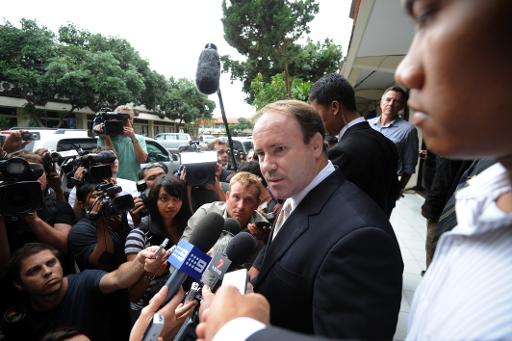JAKARTA/PERTH – Indonesia summoned Australia's ambassador on Friday to explain media reports his embassy in Jakarta was used to snoop on Southeast Asia's biggest country as part of a U.S.-led global spying network.
Indonesia called in the chief U.S. diplomat in Jakarta this week over the spying allegations, while China on Thursday demanded an explanation from the United States after the Sydney Morning Herald newspaper reported Australian embassies across Asia were part of the U.S. espionage operation.
News of Australia's role in a U.S.-led surveillance network could damage relations with Indonesia, Australia's nearest Asian neighbour and important strategic ally.
"Indonesia's Foreign Minister Marty Natalegawa has demanded an explanation from the Australian ambassador in Jakarta about the existence and use of surveillance facilities in the Australian embassy here," Indonesia's Foreign Ministry said in a statement.
"The reported activities absolutely do not reflect the spirit of a close and friendly relationship between the two neighbours and are considered unacceptable by the government of Indonesia."
Australia confirmed its ambassador to Indonesia had been called in to "discuss Indonesia's concerns about media allegations of intelligence activity by Australia", saying the ambassador "took careful note of the issues raised".
Chinese Foreign Ministry spokeswoman Hua Chunying again expressed concern about the reports, saying Beijing was asking Canberra for "clarification".
The Sydney Morning Herald said its reports were based on U.S. whistleblower Edward Snowden and a former Australian intelligence officer.
Snowden leaks to other media have detailed vast intelligence collection by the U.S. National Security Agency (NSA) on allies, including German Chancellor Angela Merkel, prompting protests and a U.S. review of intelligence gathering.
"Division of labour"
The Herald said Australia's top secret Defence Signals Directorate (DSD), which is at the forefront of cyber security intelligence, operates clandestine surveillance facilities at embassies without the knowledge of most Australian diplomats.
"DSD is the most important of Australian intelligence agencies. It is involved in high-level technical cooperation with its American counterpart, the National Security Agency," said Richard Tanter, senior research associate at the Nautilus Institute of Security and Sustainability.
"The U.S. would find it very useful to have its own intercept from its own embassies in those countries, it will find it very useful to be supplemented by what Australia is doing ... a kind of division of labour from country to country."
Tanter said Australia had been monitoring Indonesia for a long-time, seeking terrorism and human rights information.
"But the problem is when it goes beyond that. Beyond that, there will a question of whether such electronic intercepts really are appropriate activity for a country which we have a strong and close relationship," he said.
Natalegawa, in Australia for a meeting with his counterpart Julie Bishop and other foreign ministers from the region, said Australian spying could "potentially damage the kind of trust and confidence that have been nurtured and developed over many decades".
"I think we have been able to communicate to Foreign Minister Bishop about our concern," Natalegawa told reporters in the Australian city of Perth.
Bishop said: "Foreign Minister Natalegawa raised his concerns, I took them on board, I take them seriously, but the Australian government does not and will not comment on intelligence matters."
Relations were already shaky after Australia's new conservative prime minister, Tony Abbott, in September proposed turning back boats of asylum-seekers coming through Indonesia.
Abbott made his first official trip overseas to Jakarta last month where he sought to play down tension over the asylum-seekers issue and called instead on both countries to focus on boosting trade.





















































